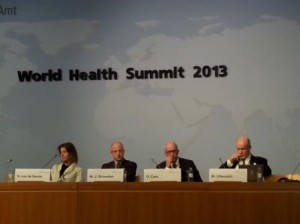The participating countries of the first JPIAMR call have been published in the Pre-Call Announcement page. The call opens on January 27.
Category: News and press
Report on the global state of antiobiotic resistance. Read more
The Lancet Infectious Diseases released this week a report on the global state of antibiotic resistance, co-authored by CDDEP Director Ramanan Laxminarayan.
News on drug resistance and other topics in global health. Read it online
The Lancet Infectious Diseases released this week a report on the global state of antibiotic resistance,
co-authored by CDDEP Director Ramanan Laxminarayan.
Awareness day the 18th of November
Antimicrobial Resistance at the World Health Summit 2013

The JPI AMR has participated this week at the World Health Summit 2013 with a dedicated symposium on “Current Challenges in Combating Antimicrobial Resistances”.
The World Health Summit has been held in Berlin from October 20-22, 2013 with the aim to improved Health worldwide, catalyzed through collaboration and open dialogue, setting tomorrow`s agenda for improved research, education, Health care and policy outcomes.
How can we support synergies between Health and other sectors? How can we develop shared solutions to drive people-centered, inclusive development? These are only two of the questions, the World Health Summit 2013 has address and AMR has been one of the few thematic areas discussed highlighted its increasing relevance in the Health policy area.
More information at: http://www.worldhealthsummit.org/
Public consultation of strategic research agenda concluded
The online form for submitting comments on the SRA draft has closed. We would like to thank all of you who read and commented the document. This is much appreciated! Your comments will now be digested by the SRA working group and necessary changes will be made to the SRA document. The finalised SRA is expected to be published in the beginning of 2014.
New video launch!
Winning the battle against multi-resistant bacteria.
Read more under “News and Events”
https://www.jpiamr.eu/news-and-events/video/
Canada joins JPIAMR!
Canada has now become a full member of JPIAMR, increasing the member count to 19.
US “Antimicrobial ResistanceThreat Report 2013”
This report, Antibiotic resistance threats in the United States, 2013 gives a first-ever snapshot of the burden and threats posed by the antibiotic-resistant germs having the most impact on human health.
Each year in the United States, at least 2 million people become infected with bacteria that are resistant to antibiotics and at least 23,000 people die each year as a direct result of these infections. Many more people die from other conditions that were complicated by an antibiotic-resistant infection.
Antimicrobial resistance news feature in Nature
Antibiotic resistance: The last resort
Health officials are watching in horror as bacteria become resistant to powerful carbapenem antibiotics — one of the last drugs on the shelf.